First and foremost: RIP, John Paul Leon. Graeme and I recorded this episode before learning of his passing, but I edited after. By every account, he was a great person, but he was also an extraordinary talent that worked on the high watermarks of his generation, a brilliant and tremendous artist. And now he’s also gone far too soon. Again, Rest in Peace and in Power.
Previously on Drokk!: If there’s one thing that we’ve learned in the last couple of episodes of Drokk!, it’s that the 1990s was a strange time for Judge Dredd as a strip, but that things seemed to be on the upswing the more involved co-creator John Wagner got. If we learned two things, it’s that Wagner had a strange fascination with Bill Clinton, but go and listen to last month’s episode for more on that.
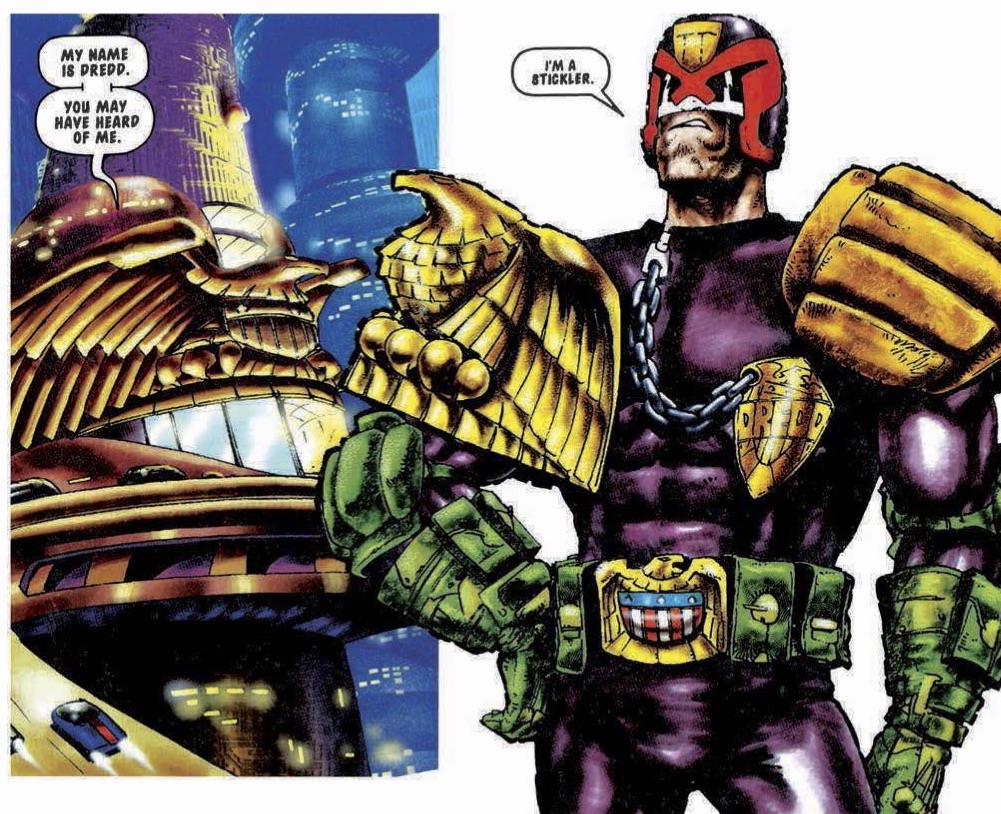
0:00:00-0:02:41: We’re going back literally 25 years for this month’s episode, with Judge Dredd: The Complete Case Files Vol. 24 offering material from a lot of different people dating back to 1995 and 1996 — and offering two different ways in which John Wagner tries to break the formula of the strip in particularly entertaining ways. (Also, the audio on my side is a bit odd this episode, but we’re coming from Verity Lambert Block, in case it’s not too clear.)
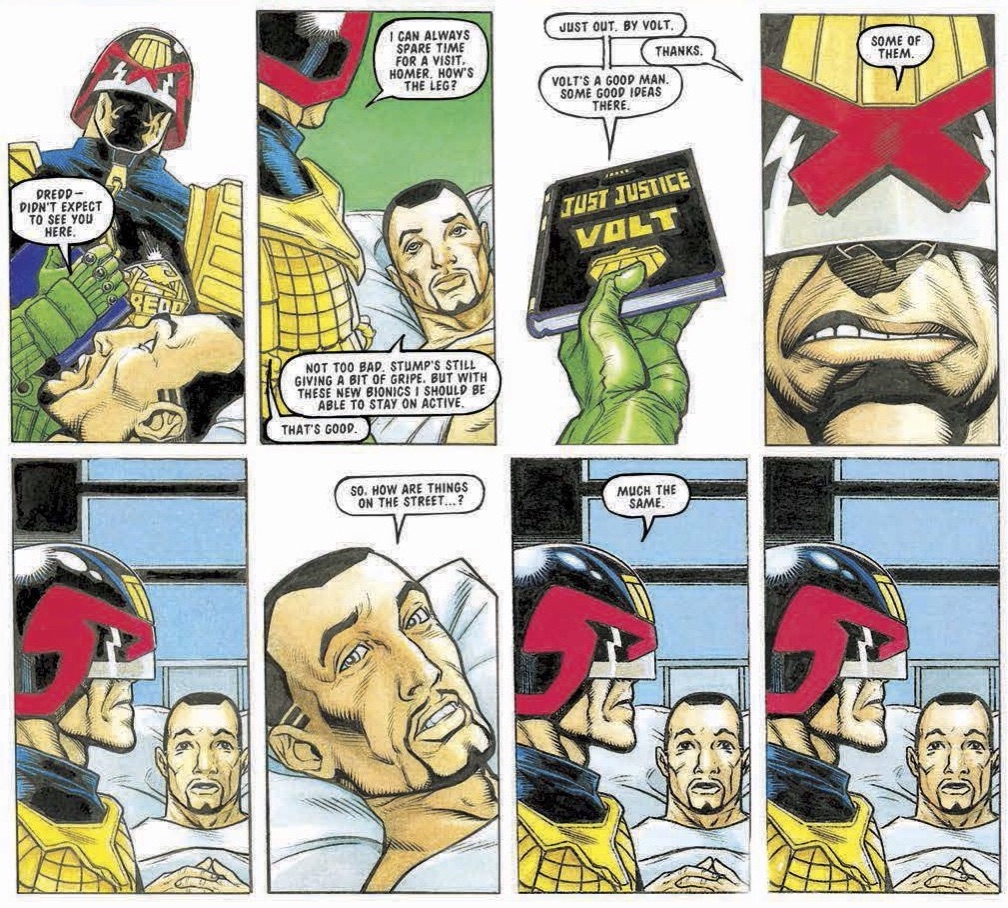
0:02:42-0:14:04: As is our tradition, we start off by talking about things that we didn’t particularly like about the volume, as we discuss whether or not the sheer competency of the material on display here — even the weaker stories — make this a surprisingly dull book, with the Judge Dredd Magazine strips in particular feeling disappointing. Is it just me? Jeff seems to like them well enough, after all, although that might be because he’s high when he’s reading…
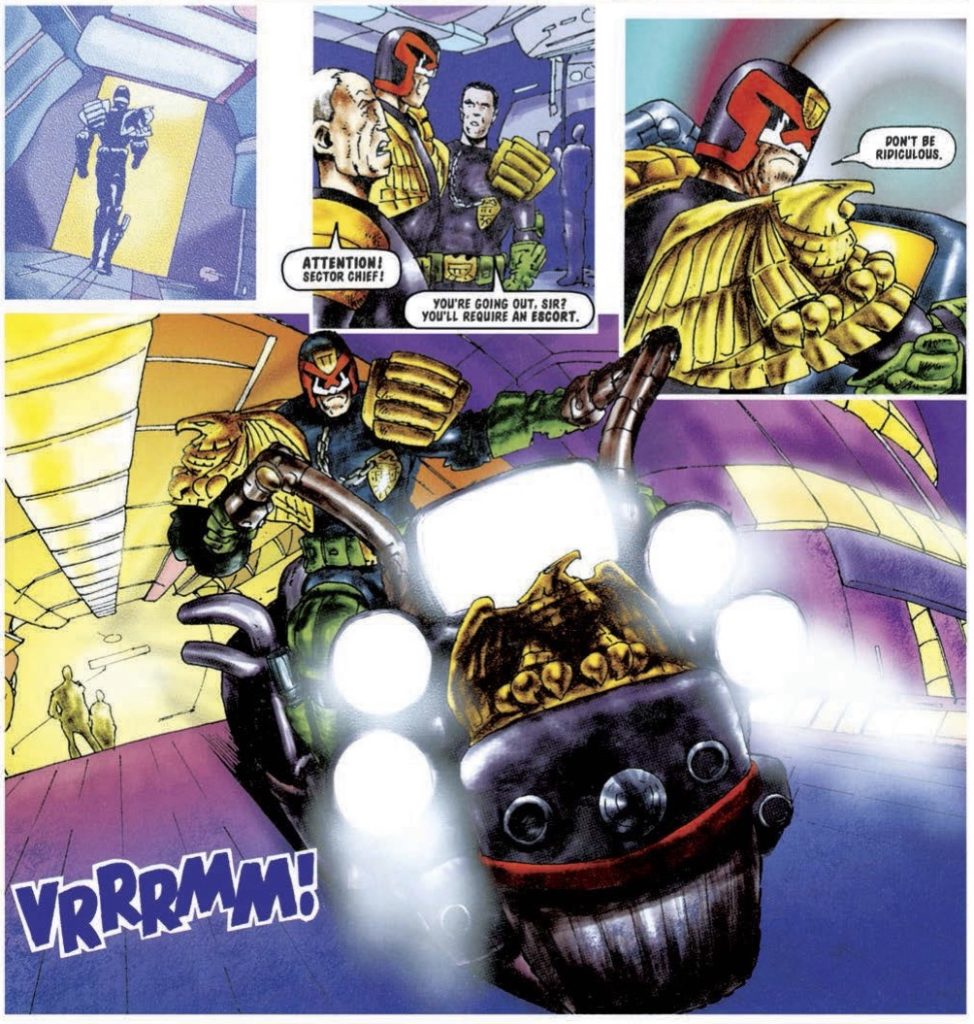
0:14:05-0:22:27: Earlier than intended, we just naturally fall into talking about “The Pit,” the longest of the stories in this book, and a sneaky soft reboot of the strip, to boot. What TV show is Wagner referencing, if at all? How does it underscore the strangeness at the heart of Dredd as a character? And, really, isn’t it great? (The answer to that last bit, at least, is “yes.”)

0:22:28-0:31:01: With Wagner offering up such strong work in “The Pit,” does that negatively impact everything around it? We talk about the possibility that the other stories aren’t necessarily bad, but simply pale in comparison to what Wagner’s doing. That doesn’t excuse Pat Mills’ contribution to the volume, which seems confusing on the very face of it — sure, “Hammerstein” has a Judge Dredd logo on it, but it’s most definitely not a Judge Dredd story. (Fans of the ABC Warriors, though, might be happy enough to see it.)
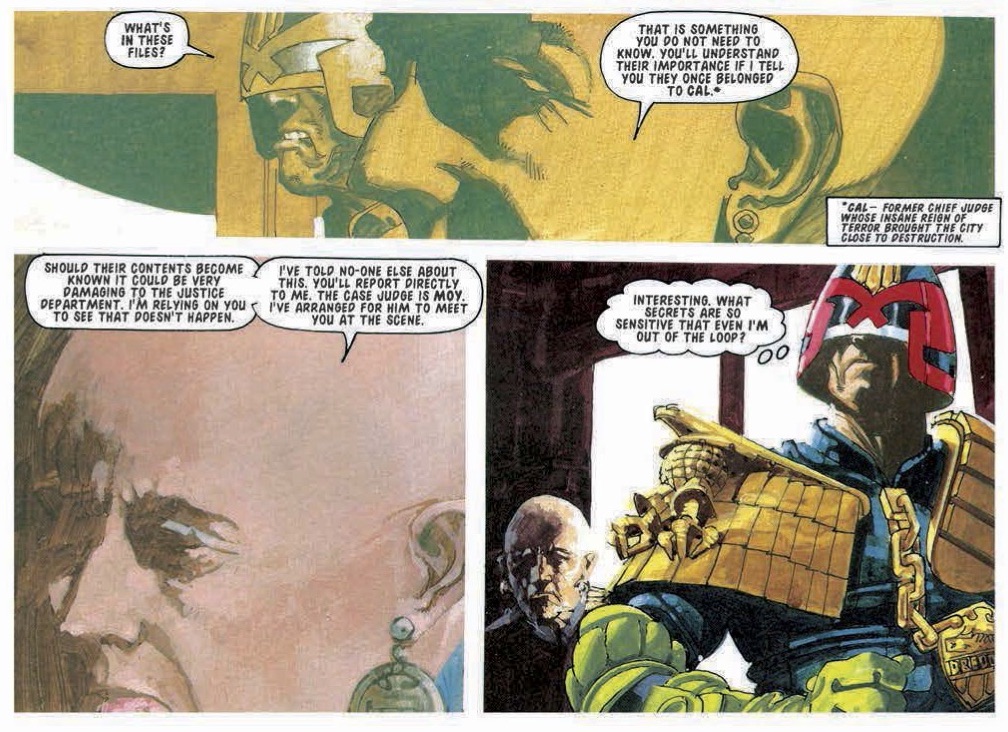
0:31:02-0:46:21: We barrel through stories, touching on “The Cal Files,” Wagner’s other significant contribution — and a really good storyline we could have spent more time on — as well as Mark Millar and Steve Yeowell’s beautifully-illustrated-but-trash-really “The Man Who Broke The Law,” the idea of a story being good for a particular creator but otherwise objectively shitty, and what Dan Abnett gets right in his sole contribution to the book that others fail at. Spoilers: it’s not just that he’s telling a Will Eisner Spirit story, despite my obsession with that strip as a model for good Dredd.
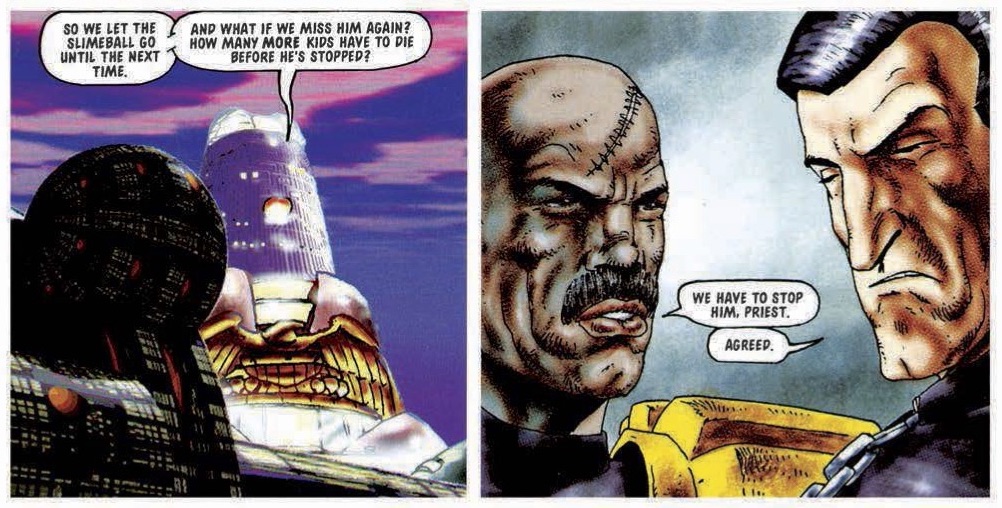
0:46:22-0:58:50: We head back into “The Pit” to talk about the way in which it is that rare thing: A Dredd strip that decentralizes Dredd and offers other characters the chance to have lives and relationships that don’t revolve entirely around ol’ stoney face. It is, as Jeff describes it, a serial that is full of “police drama-ness,” which feels surprisingly novel for a comic strip almost two decades into its existence that, in theory, is all about a policeman. Which leads us to talk about…
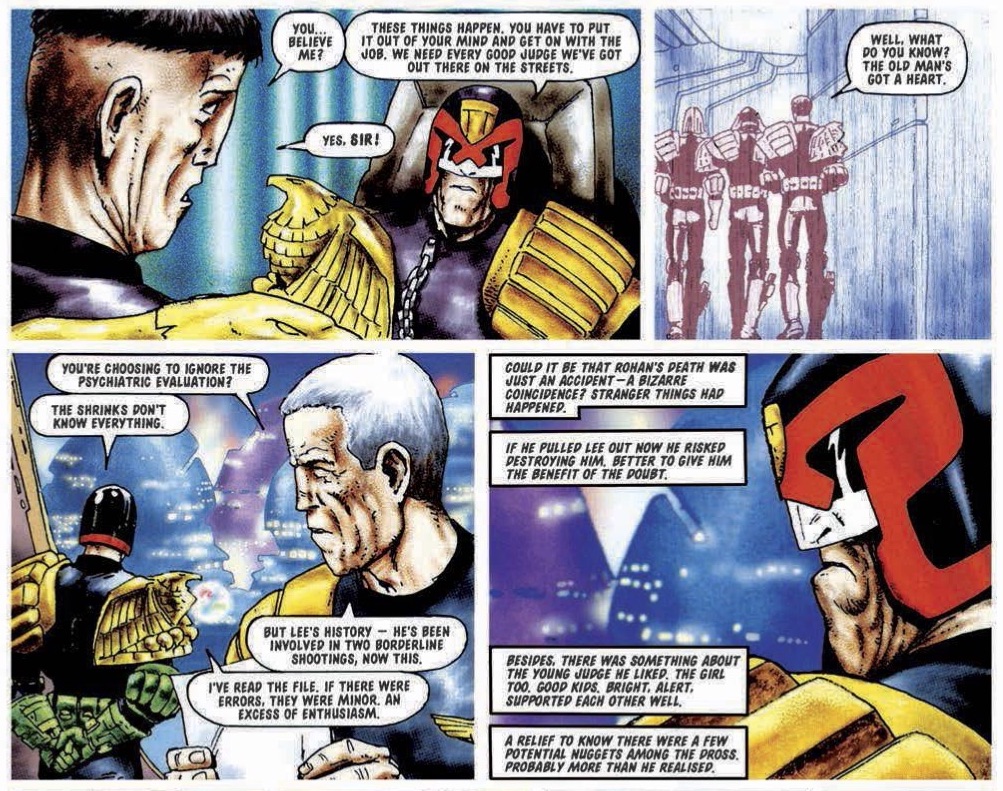
0:58:51-1:15:26: …the idea that John Wagner uses his two primary stories here to find new things to say about policing, as seen through the prism of Mega-City One, and what it means that Wagner continues to try and evolve the strip even as other writers are still trying to grapple with a formula he established years ago. Also discussed: Is Wagner like Jack Kirby, and if so, in what ways? Is “The Cal Files” the beginning of a reappraisal of an idea seemingly abandoned after “Mechanismo”? Was there a rethink at 2000 AD editorial about the different purposes of 2000 AD and the Magazine, in terms of what each individual series brings to the table that is Dredd?
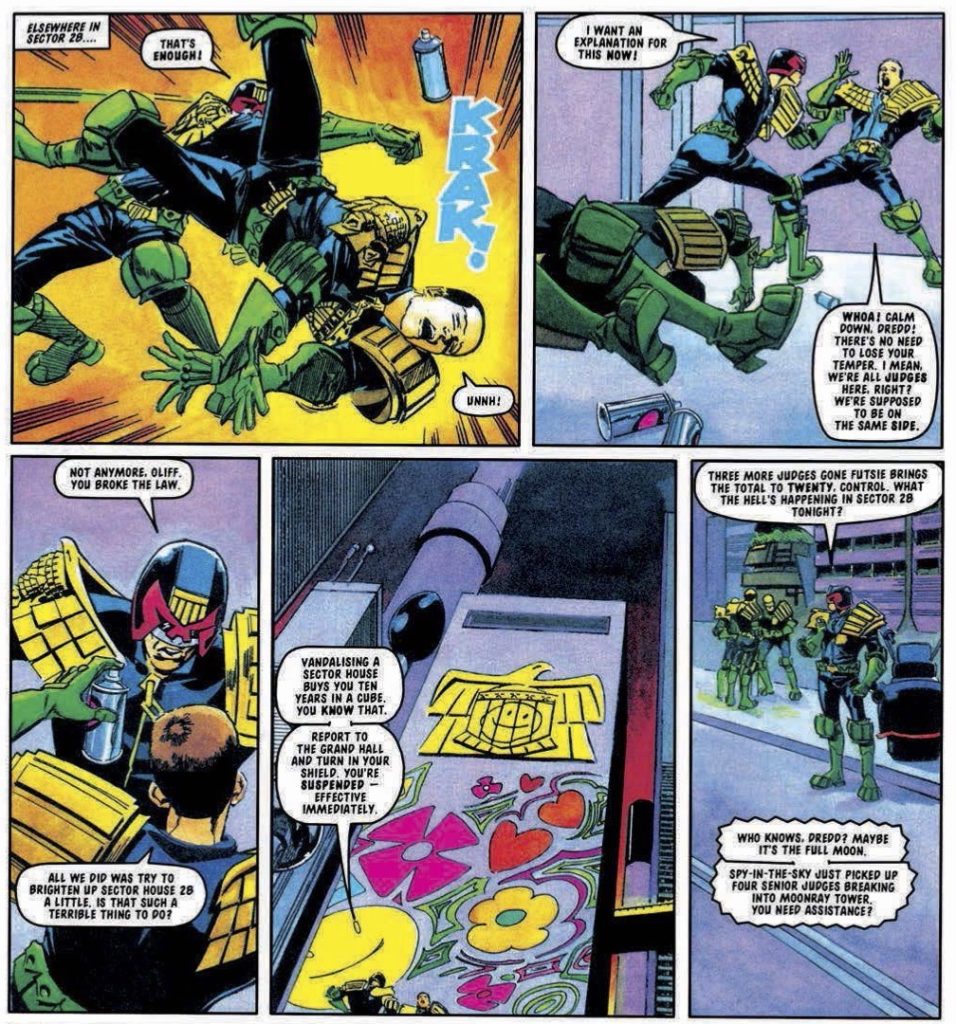
1:15:27-1:30:17: We back into the “Drokk or Dross question,” as I put it, by talking about whether or not the Magazine material really is worse than the 2000 AD material this time around, and offering up potential reasons why that might be so. (Both of us think it’s Drokk, by the way.) We also talk about the art in this volume, with me calling out both Steve Yeowell and Simon Davis, and offer up our favorite non-John Wagner stories here, before going on to praise Wagner to the heavens for “The Pit” especially, because (for me) it offers something new to Dredd as a series, and (for Jeff) it sees Wagner really approach things from a police procedural point of view, albeit in a skewed manner.
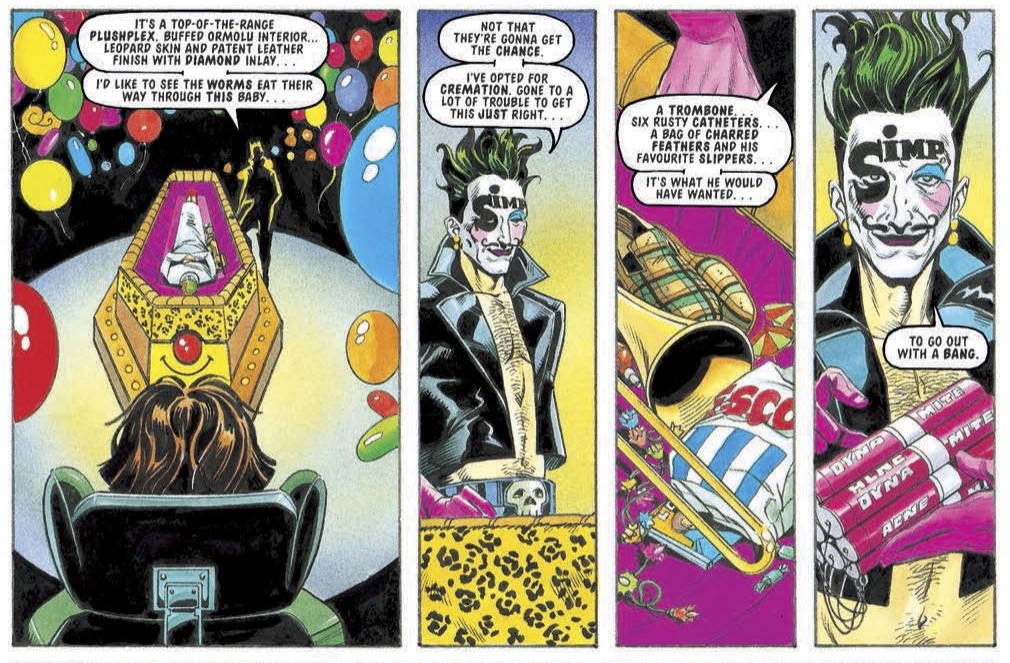
1:30:18-1:39:04: We’re not done, though; Jeff explores his love for the story “Mondo Simp” some more, and we discuss queer coding, and our differing reactions to where this story falls in the John Smith canon. There’s also a Mark Millar podcast idea that Jeff invents that has a name that really shouldn’t be ignored, and I hope someone picks it up and uses it as soon as possible. (And then invites Jeff on to share his feelings on the matter.)
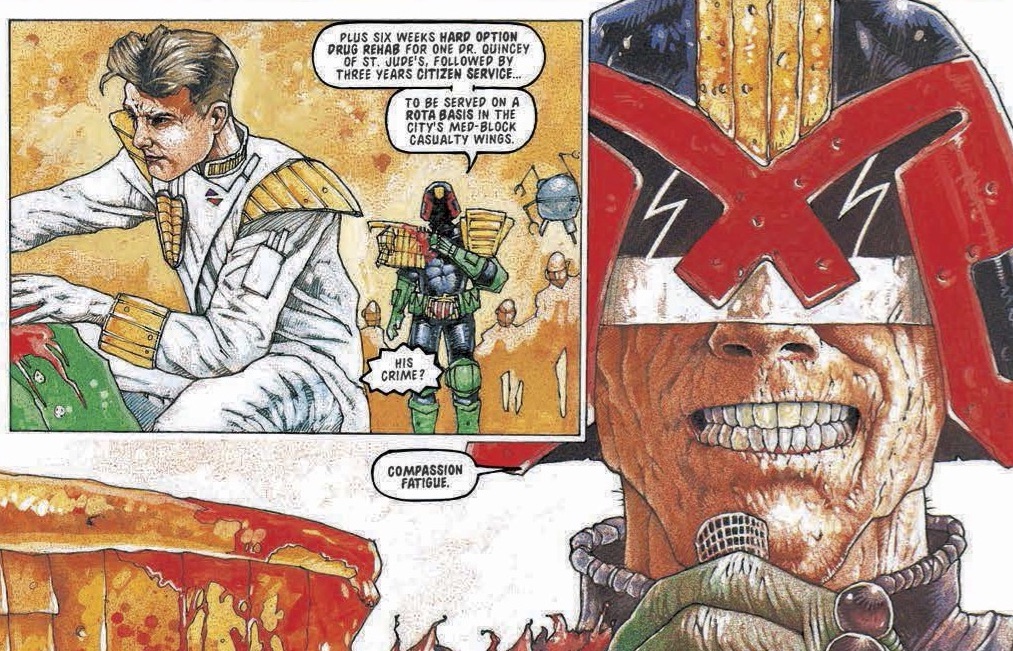
1:39:05-end: We close things down by reaffirming that we love “The Pit,” looking ahead to the next volume, and sharing the traditional mentions of our Tumblr, Instagram, Twitter and Patreon accounts, while also teasing a Geoff Johns discussion in the next Wait, What? that may never happen. This is why you tune in, Whatnauts, and we’re so very glad that you do.
— chris ☔ (@cripuskas) January 24, 2021
i know people hate cgi but christ godzilla vs kong is the movie we invented cgi for
— a pussy licking demon with vanilla flavoured semen (@MECHNOIR) March 31, 2021
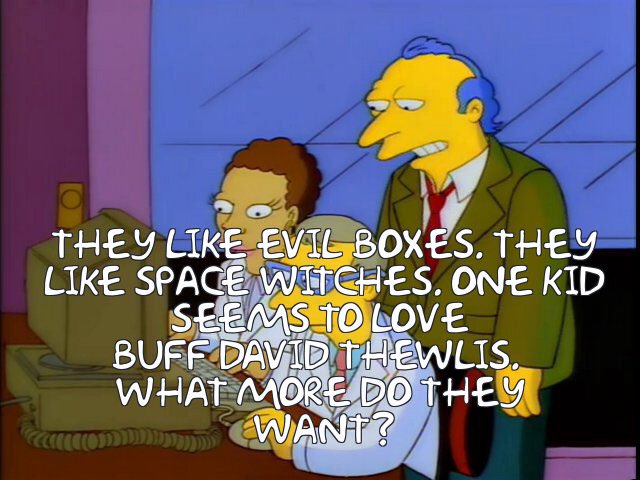
Amazingly great image ganked from the amazingly great Twitter feed of @DieRobinsonDie!
Previously on Drokk!: Character co-creator John Wagner has returned to the Judge Dredd fold on a regular basis, and if the result isn’t exactly the highpoint of the strip from the 1980s, it’s still far better than we’ve seen under replacement writers like Garth Ennis and Mark Millar. (Both of whom were very early in their careers at the time.) Is there life to Dredd beyond Wagner?
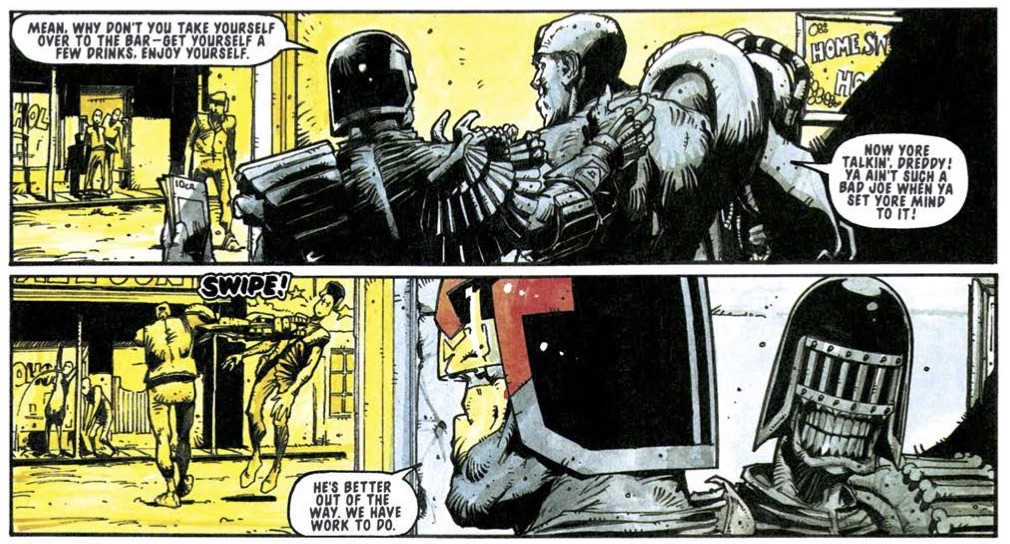
0:00:00-0:05:48: We’re covering Judge Dredd: The Complete Case Files Vol. 23 this episode, and both Jeff and myself are a little surprised at how much we enjoyed the book — especially given that we’re both willing to admit that this is far from the best the character has been. Given the high number of writers on this volume, could it be that people other than Wagner are finally figuring out how to do Dredd right?
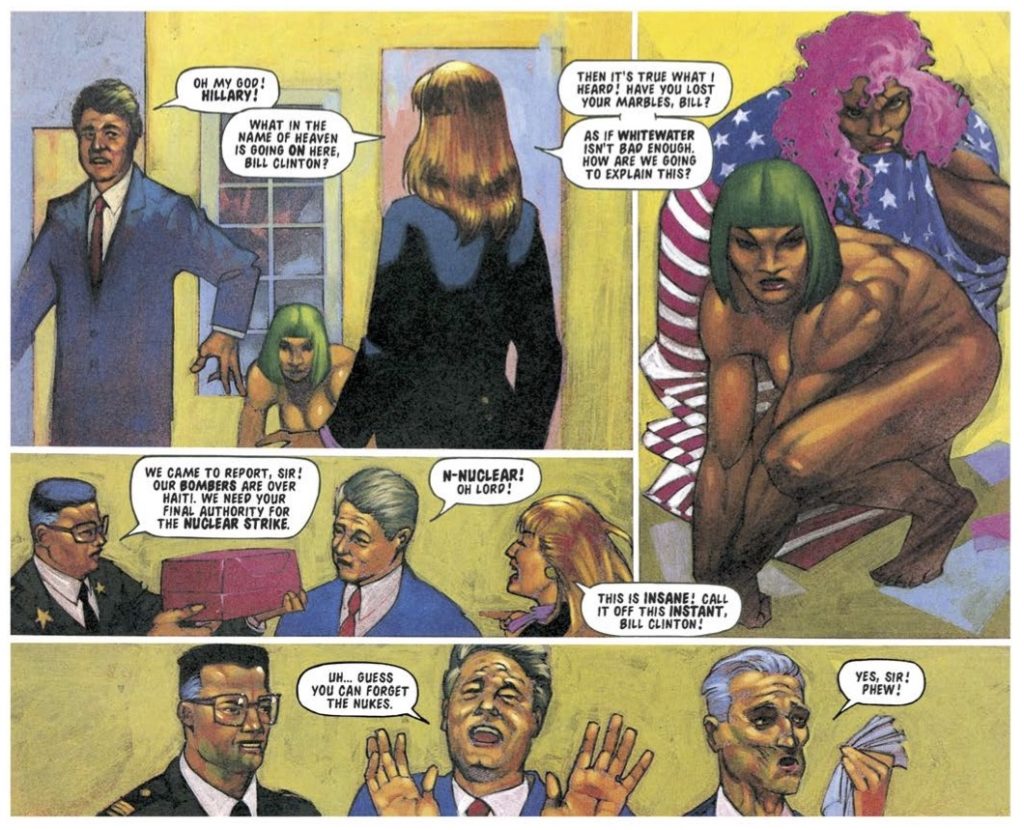
0:05:49-0:19:51: The first question I have for Jeff this episode is maybe the most obvious question of the book: exactly what was John Wagner’s deal with Bill Clinton? This collection has two separate stories parodying Clinton, both of which appeared at a time when I believed the President was more or less popular on both sides of the Atlantic. The educated Mr. Lester puts me right with a history lesson, and also attempts to answer my question by suggesting just what Wagner might have been writing about with regards to the Celebrity Saxophonist President’s appearances — both literal and parodic — in here.
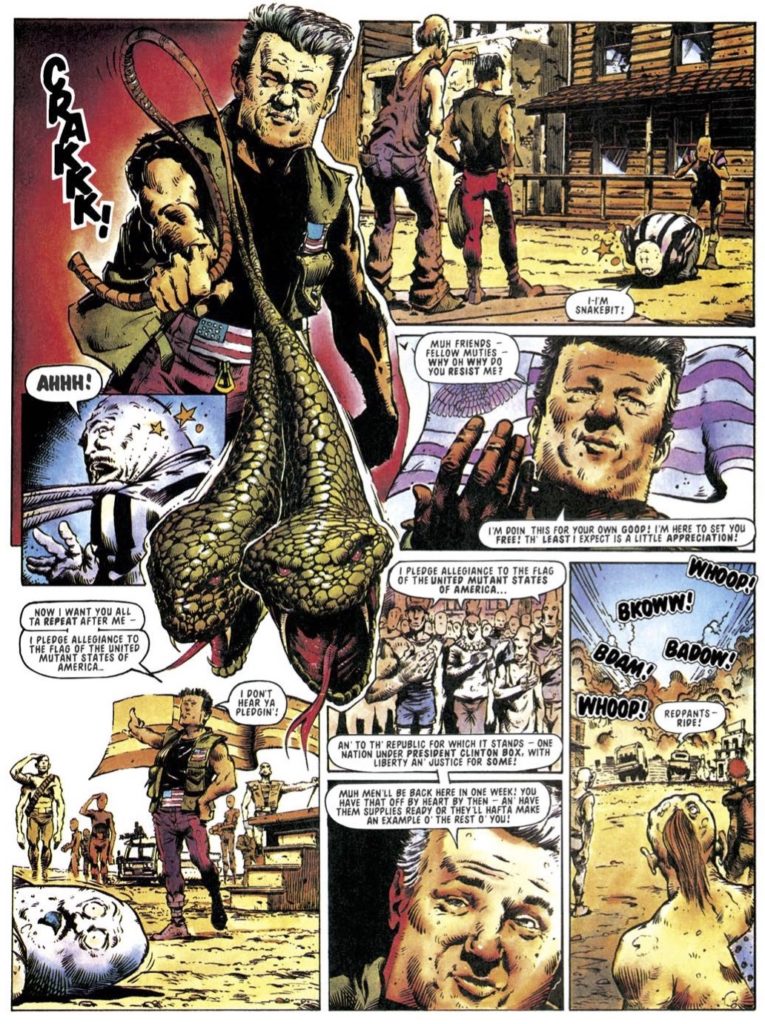
0:19:52-0:27:36: The second of the Clinton-centric stories is “The Three Amigos,” and Jeff and I talk about its appeal beyond any Presidential parody: that it’s a particularly Wagnerian tale that originally feels just the opposite, that it’s a classic Dredd mix of the ridiculous, the smart, and the gloriously stupid, and that it offers fan service in such a way that ultimately feels true to the spirit of Dredd (and John Wagner) and feels like great examples of both. We like the story, to say the least.

0:27:37-0:51:30: This leads into a discussion of whether or not the collection feels like it’s full of “classic Dredd” stories or not, and what that idea even means. How has John Wagner evolved as a writer, and does that evolution mean that he couldn’t write the same kind of stories as he did back in the 1990s? What is different in terms of what Wagner is trying to do in his stories in this volume? Can other writers measure up, or even find ways to continue what Jeff calls Wagner’s “melancholic” stories about Mega-City One using Dredd? Oh, and because we’re talking “classic” Dredd, everyone will be happy to know that we also talk about the racist “Language Barrier” short as well. No, not happy, what’s the word I’m looking for? Exhausted. That’s right. Also under the briefest of discussions: Is “bad” John Wagner just like Alan Grant?

0:51:31-0:59:18: It’s not all John Wagner and the new generation of Dredd writers this time out, though; Garth Ennis returns unexpectedly with an overlong return to his self-consciously badass creation Jonni Kiss. To no-one’s surprise, Jeff dug it and I didn’t, and we talk a little bit about why, as well as how Ennis seemed to be about to escape from John Wagner’s shadow by embracing the spaghetti western, and how Wagner managed to ruin it.
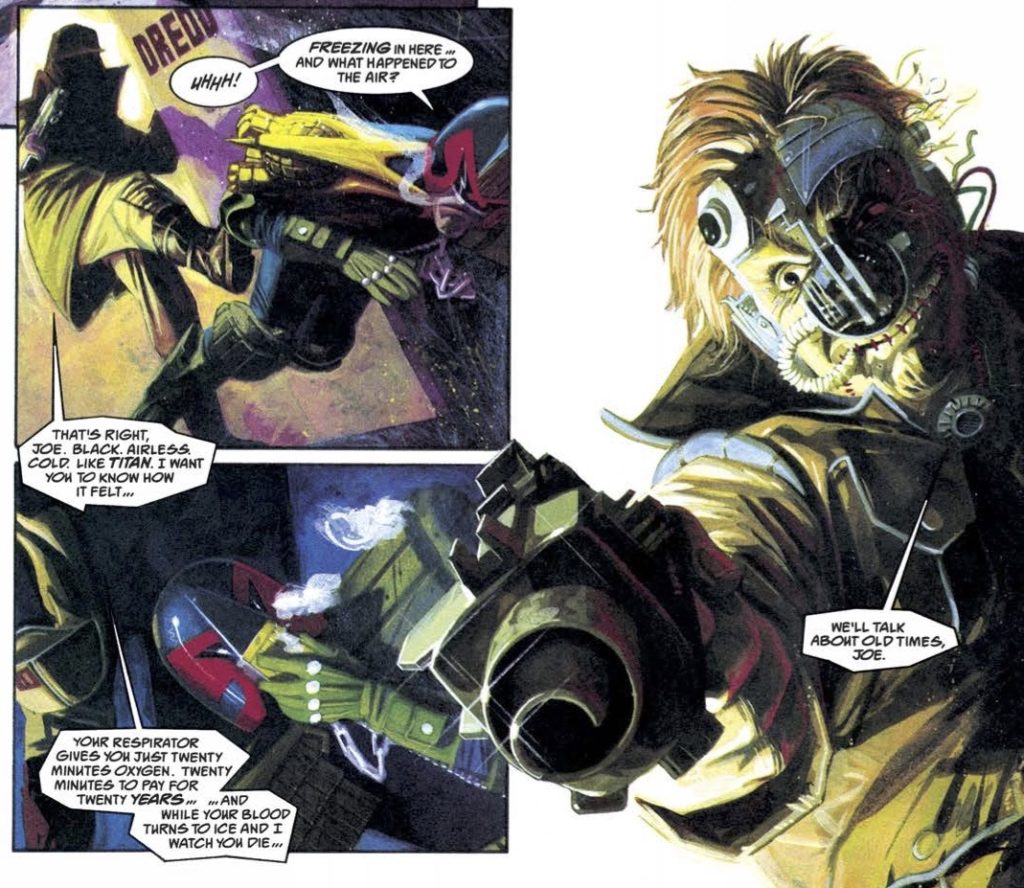
0:59:19-1:11:13: As if Ennis’s return wasn’t enough, this volume also sees the first Pat Mills Dredd work in a decade or so, and he’s basically rewriting one of his earliest contributions to the series. Does it work? Not really, and we talk about why, with Jeff bringing up the unexpected tropes that Mills seems eager to insert into the relationship between Dredd and his brother. Meanwhile, I really like Paul Johnston’s artwork, and Jeff doesn’t, and we talk for a little bit about why that is.

1:11:14-1:19:17: What is it about Dredd that Ennis and Mills don’t seem to grasp, but which John Wagner seems to have an instinctive feel for? Could it be that the latter really doesn’t seem to be concerned with showing Dredd to be particularly tough or even aware of anything beyond doing his job, whereas other writers — including Grant Morrison, in earlier stories — seem obsessed with giving the character a hero moment to remind readers that he is, in fact, the most macho character in comics?

1:19:18-1:29:28: Is Judge Dredd a nihilistic strip? I argue that it’s not, but my esteemed colleague is far from convinced and has some examples to push his depressing agenda. I think that there’s a kindness and humanity in the strip — especially under Wagner, but not exclusively — that would belie it being truly nihilistic, and Jeff concedes that, if nothing else, Wagner refuses to be nihilistic towards recurring characters, and has an interesting theory as to why that might be.
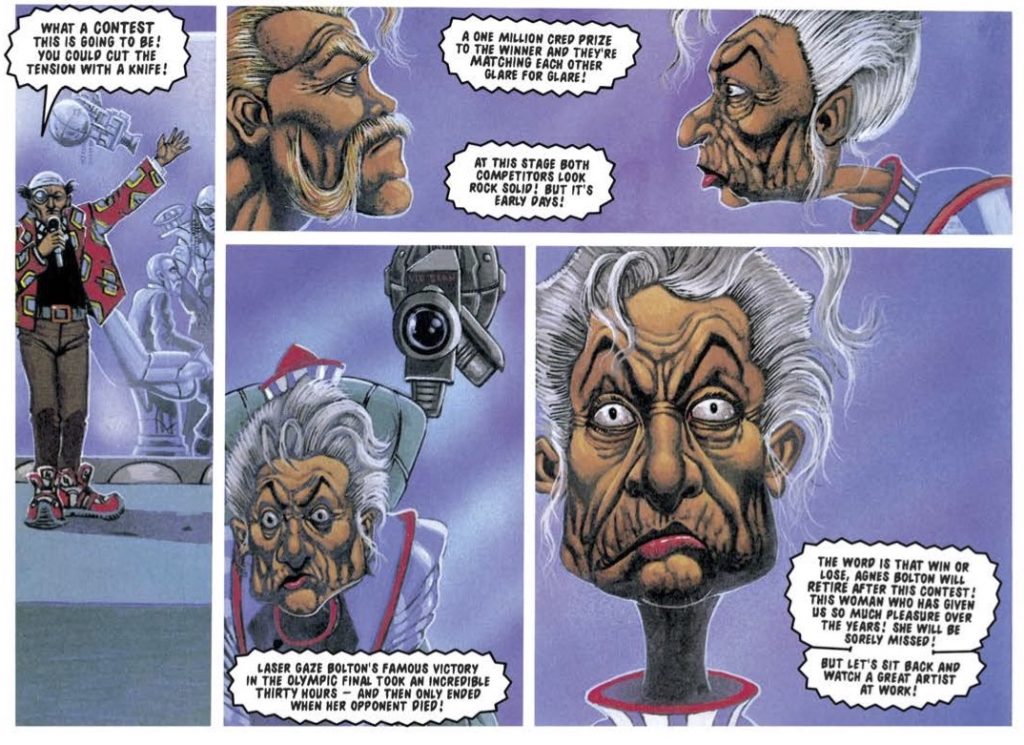
1:29:29-1:40:14: And so, is this volume Drokk or Dross? As might be clear by this point, we both think it’s Drokk, and we talk about our favorite stories — for me, “The Three Amigos,” for Jeff, the one-off “Bug Crazy,” but Jeff also talks a little bit more about the Ennis strip because he wants to torture me.
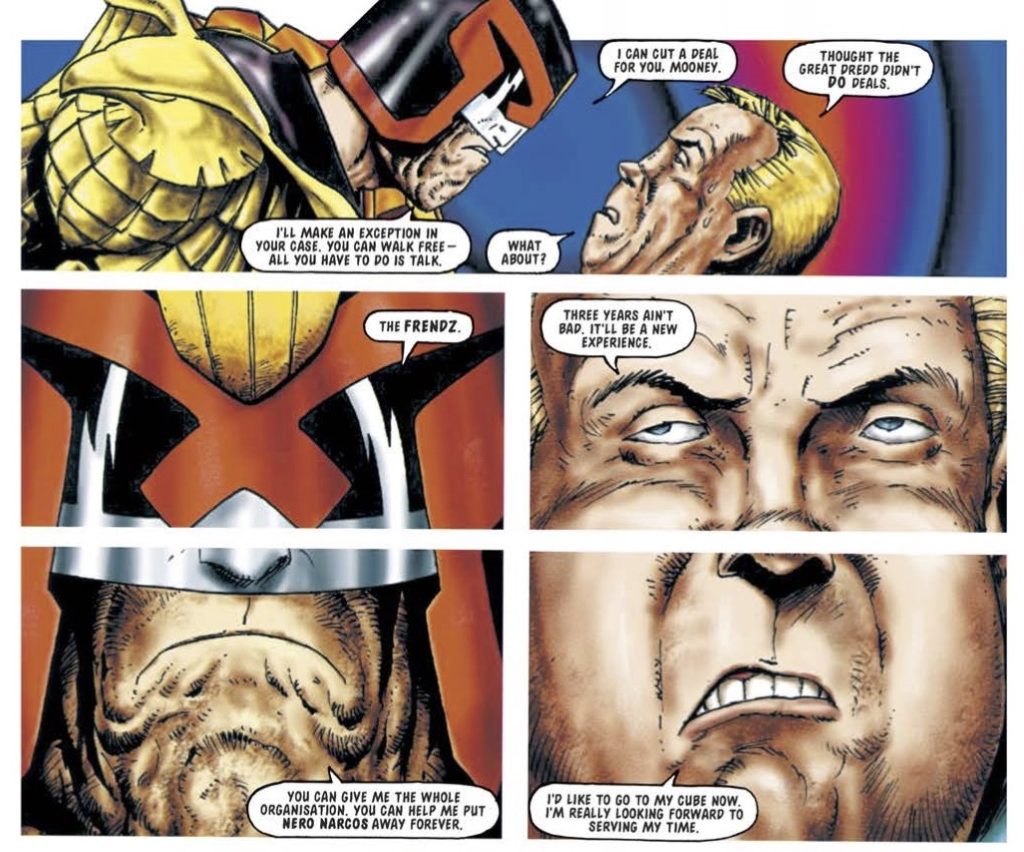
1:40:15-:1:46:41: Somehow, we’d gotten this far into the episode before we even mentioned “Bad Frendz,” a Wagner/Carlos Ezquerra collaboration that does everything you want a good Dredd to do, and also sets up things for the future — but that’s perhaps a sign that this collection was far better than it had any rights to be.
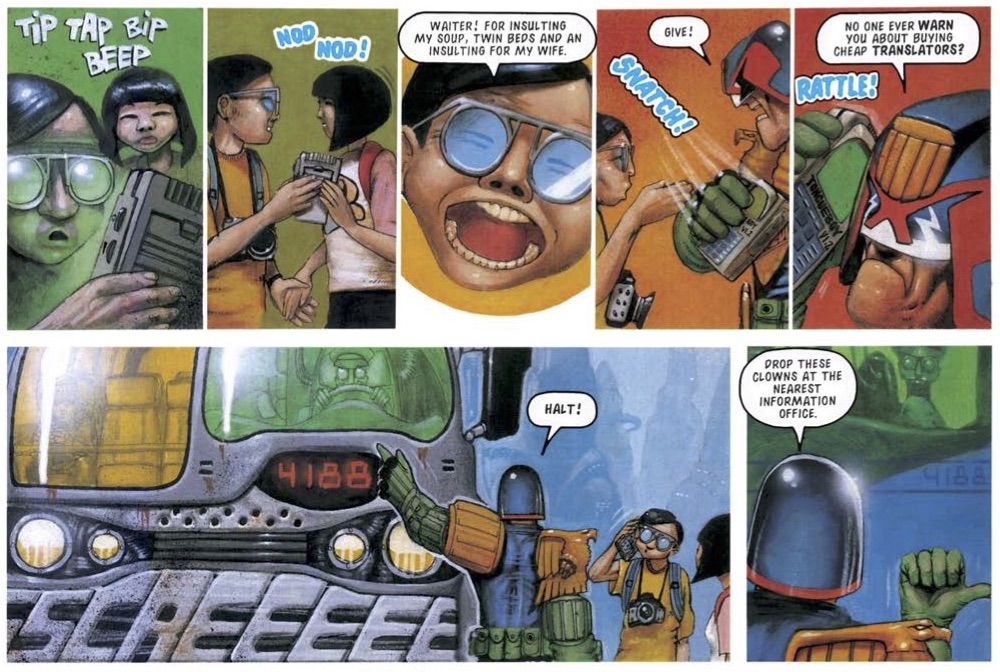
1:46:42-end: We wrap things up by looking ahead to the next episode, in which we’ll reach “The Pit,” an attempt to change the status quo around Dredd in an unexpected way, and also do our usual wrap up mentions of the usual suspect sites: Tumblr, Instagram, Twitter, and Patreon. As always, thanks for listening and reading along. Be back in a month for Dredd in a position he never asked for…
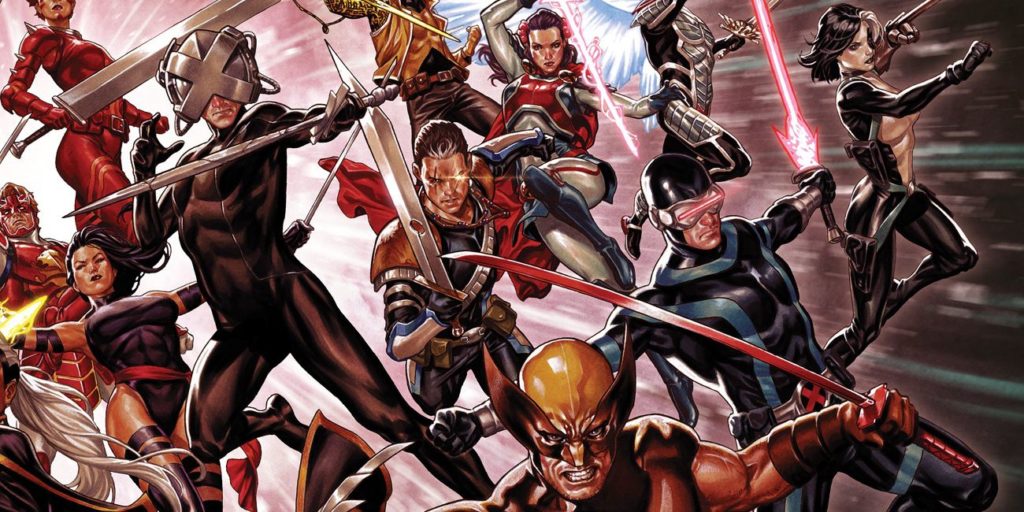 2:52-40:55: Fortunately for all Graeme easily steers us away from Jeff’s overdeveloped fight or flight response by immediately starting in about what he’s been reading which is the X of Swords event, all of which has meandered its way onto Marvel Unlimited. FULL SPOILERS for this recent Hickman led X-event which many loved but Graeme…well, Graeme not so much, frankly. And it also led Graeme to consider things that happened in the event with the finale of Wandavision where similar things were going on. FULL SPOILERS as well for Wandavision although since these two pieces, X of Swords and Wandavision, are used as the backbone for the topic that unfolds, I’m not sure what to flag as spoiler-free or when? In short, if you don’t want to be spoiled about either/both topic, maybe put this one of the shelf and come back to it when you’ve experienced either/both pieces for yourself? Because although this starts as a discussion about X of Swords for the first chunk of time, Wandavision factoids drop in and out occasionally. I’ll try to let you know when we move from the X of Swords-heavy stuff to the Wandavision-heavy stuff but if your concerns are spoilers, tread carefully! But this early part focuses on X of Swords, what Graeme found frustrating, what the appeal seems to be for those who found the event rewarding, and more.
2:52-40:55: Fortunately for all Graeme easily steers us away from Jeff’s overdeveloped fight or flight response by immediately starting in about what he’s been reading which is the X of Swords event, all of which has meandered its way onto Marvel Unlimited. FULL SPOILERS for this recent Hickman led X-event which many loved but Graeme…well, Graeme not so much, frankly. And it also led Graeme to consider things that happened in the event with the finale of Wandavision where similar things were going on. FULL SPOILERS as well for Wandavision although since these two pieces, X of Swords and Wandavision, are used as the backbone for the topic that unfolds, I’m not sure what to flag as spoiler-free or when? In short, if you don’t want to be spoiled about either/both topic, maybe put this one of the shelf and come back to it when you’ve experienced either/both pieces for yourself? Because although this starts as a discussion about X of Swords for the first chunk of time, Wandavision factoids drop in and out occasionally. I’ll try to let you know when we move from the X of Swords-heavy stuff to the Wandavision-heavy stuff but if your concerns are spoilers, tread carefully! But this early part focuses on X of Swords, what Graeme found frustrating, what the appeal seems to be for those who found the event rewarding, and more. 1:46:55-1:50:15: “It’s been a very weird episode,” Graeme says, apologizing for what he calls his “therapy session” (despite me poo-poo’ing that and talking about all the copious self-revelation I’ve put listeners through over the years). But perhaps because of this—or perhaps because it’s not necessarily a bad thing to talk about comic books on a comic book podcast—Graeme talks about the most recent issue of Suicide Squad and how it brings more of what he’d hoped he would see in Infinite Frontier: a sense of something new.
1:46:55-1:50:15: “It’s been a very weird episode,” Graeme says, apologizing for what he calls his “therapy session” (despite me poo-poo’ing that and talking about all the copious self-revelation I’ve put listeners through over the years). But perhaps because of this—or perhaps because it’s not necessarily a bad thing to talk about comic books on a comic book podcast—Graeme talks about the most recent issue of Suicide Squad and how it brings more of what he’d hoped he would see in Infinite Frontier: a sense of something new.Previously on Drokk!: After the Garth Ennis years and a tease of a Mark Millar era — not to mention an increasing reliance on formula, rendering the series surprisingly stale — Dredd co-creator John Wagner has returned to guide the character in both 2000 AD and Judge Dredd Magazine, which should be a good thing, right…? Right…?

0:00:00-0:06:33: This time around, we’re talking about Judge Dredd: The Complete Case Files Vol. 22, which collects material from 1993 and 1994, and sees Wagner firmly re-established as the primary writer of the strip (although others, including Peter Hogan and the recently departed Si Spencer, show up as well). I talk about the reasons I like the book, although Jeff isn’t convinced by either my arguments or Wagner’s attempts to break with the conventions of the strip. Is this the second schism volume in a row?

0:06:34-0:25:23: It only makes sense that we tackle the low point of the volume immediately, so we deal with “Crusade,” a Grant Morrison/Mark Millar serial that massively outstays its welcome, even with art by Mick Austin. We talk about the unexpected Pat Mills influence (especially Nemesis the Warlock), and about Mark Millar’s faith and how that plays into his writing (or doesn’t, as the case may be). We also talk about bad design choices, and the ways in which something can be “not boring,” but that doesn’t necessarily make it interesting, either. Suffice to say: we didn’t like “Crusade” at all.

0:25:24-0:38:55: We move on to “Escape from Kurt Russell,” a John Wagner/Paul Marshall short that has some interesting choices in terms of tone — we discuss whether or not the denouement is a pisstake, a joke, or just a strange idea — and perhaps a coded message to Frank Miller of all people. Perhaps more importantly, it’s also a story from 1994 that previews the plot of 2012’s Dredd movie, which neither of us expected at all, although Jeff points out in passing that there’s also a Mister Miracle Kirby influence at play that I didn’t see at all.
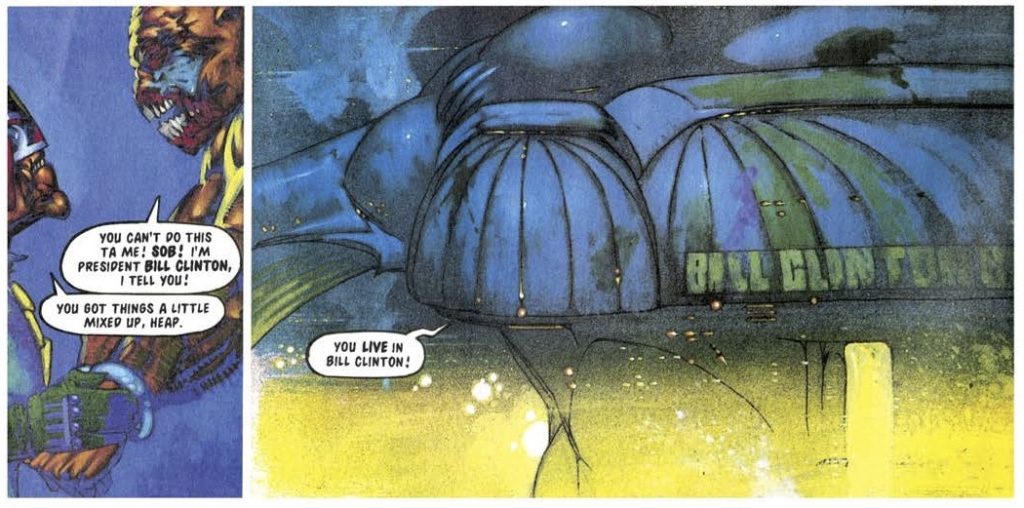
0:38:56-0:59:19: A quick spin through the majority of the other stories in the volume sees us talk about the fact that so much of this book is just… fine, which is far from a selling point. Under some discussion is the self-conscious darkness of the Magazine material from this era, the oddness that is the Bill Clinton cameo in one episode, and my theory about the real reason why John Wagner returned to Dredd — and what that might mean about the “Candidates”/“Voting Day” storyline that opens this collection.
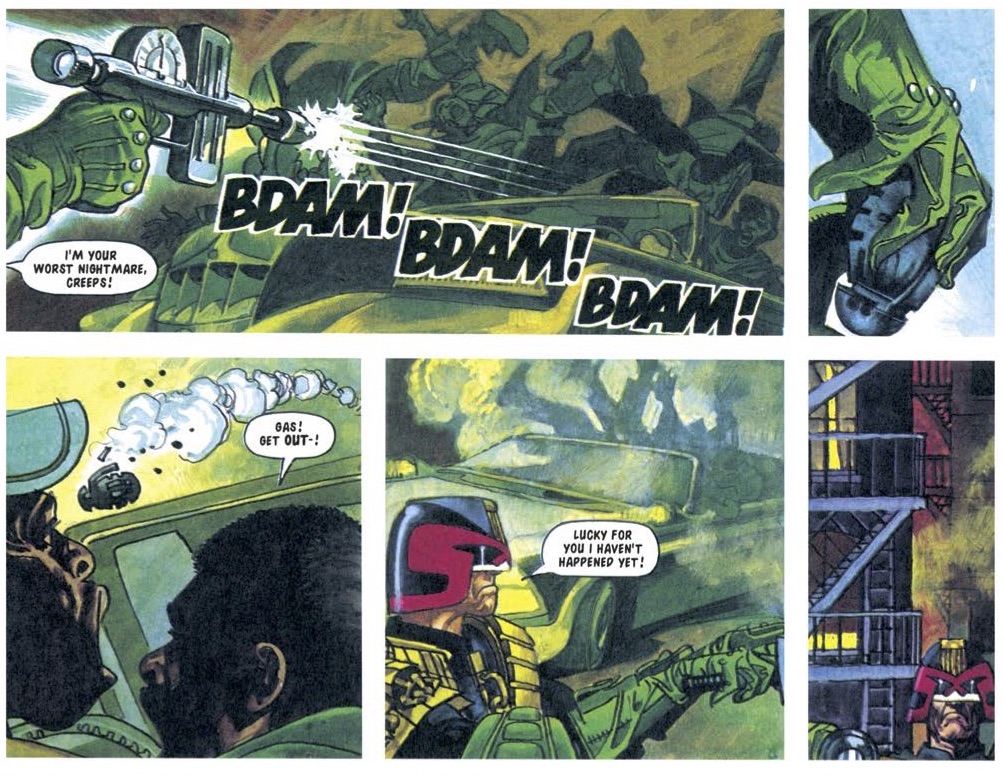
0:59:20-1:41:52: The meat of the episode is exactly what Jeff thought it would be: “The Exterminator,” a ten-episode story that entirely drops the Dredd formula in favor of… a Terminator pastiche, of all things. I love it, but Jeff is less sure, and we talk about why, as well as Jeff’s ambitious theory about what the story is actually about. Also discussed: Wagner’s awareness of racial themes and police complicity in oppressive status quos; whether or not John Wagner is purposefully trolling the makers and cast of the 1995 Judge Dredd movie with this story; editorial oversight and overreach; the parallels this serial has not only with Terminator, but also Alien; Wagner’s interest in time travel and the ways in which it could have been used more appropriately, or at least interestingly, in this particular story, and far, far more. It’s definitely Wagner trying something different with the strip, but is that enough to make it a worthwhile excursion?
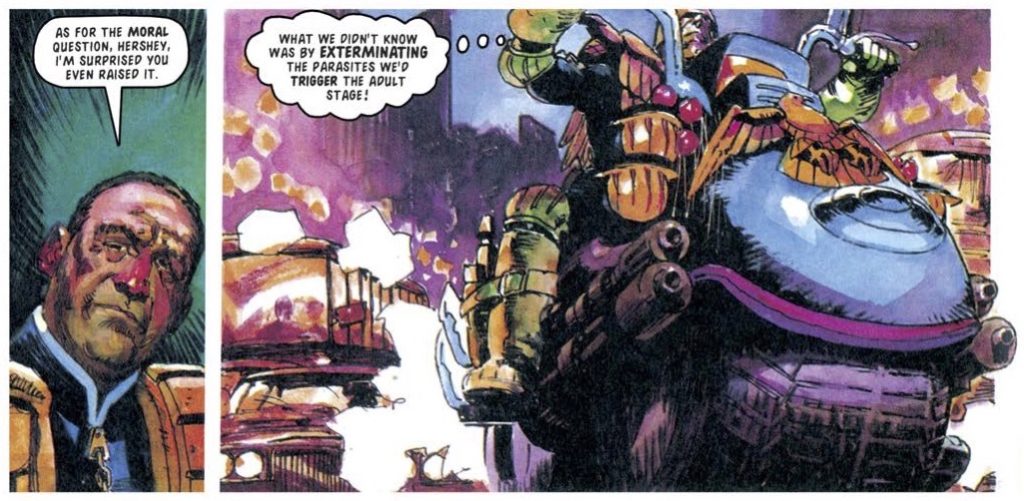
1:41:53-1:47:38: So, is this book Drokk or Dross? Both of us go for the former option, although Jeff finds it a more perilous proposition than I do. We don’t do the traditional mentioning of our favorite stories from the volume, but I’d already plumped for “The Exterminator,” and Jeff elsewhere describes it as Wagner’s potential masterpiece, so… let’s just say that’s his choice, too. (He also talks about his love for “Crash Diner,” a Wagner/Cyril Julien short from the Magazine, so perhaps that’s his choice.) Also discussed: a brief mention of what we’ll be reading next episode, which includes a return of Bill Clinton of all people…
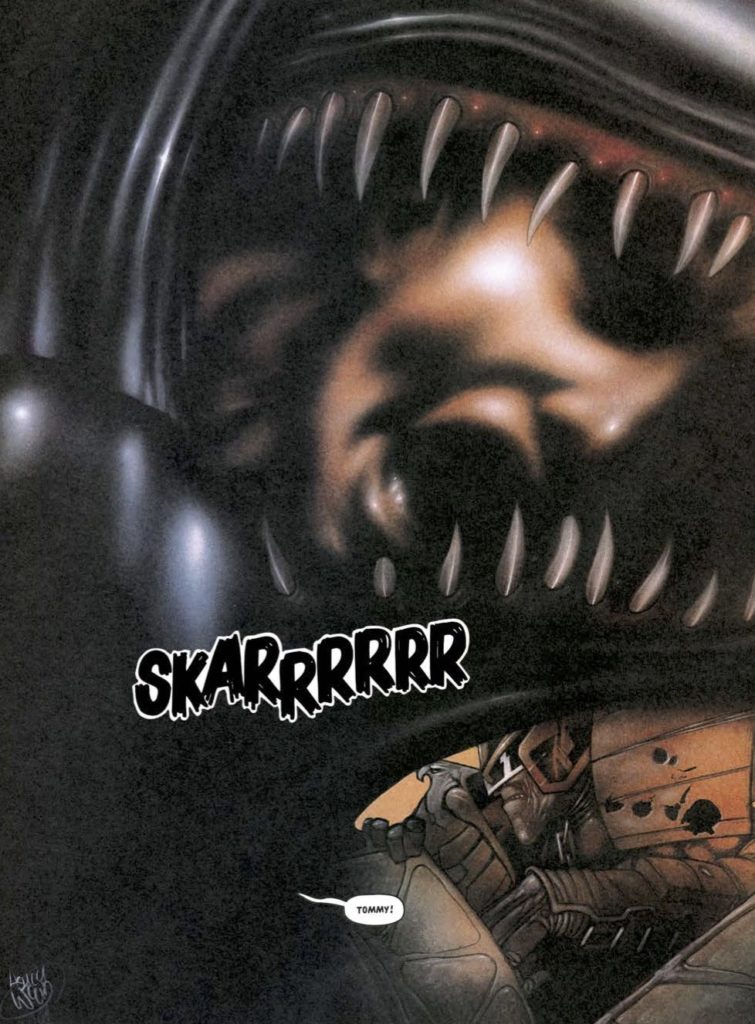
1:47:39-1:51:54: Jeff suddenly realizes that we didn’t really talk about the art in this volume as much as usual, and singles out some terrible Ashley Wood, work, some great Dean Ormston and Dermot Power work, and John Burns and Emilio Frejo’s art from “The Exterminator.” There’s also a Garth Ennis slam, just because.

1:51:55-end: We wrap things up the way we always do, by mentioning the Tumblr and Instagram that I haven’t updated in forever — I’ll change that soon, I swear — as well as our Twitter and Patreon accounts, and Jeff sings us out beautifully. We’ll be back in a month, when we’ll have to deal with checks notes new Pat Mills and Garth Ennis Dredd…? As always, thank you for listening and reading along.
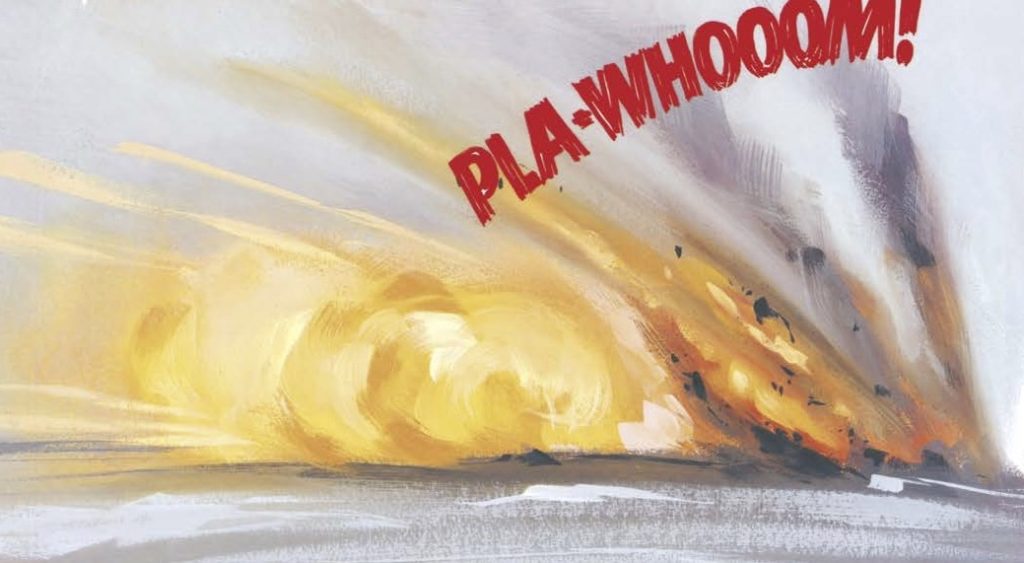
WandaVision finale prediction pic.twitter.com/v0s1uzYzfb
— Rusty Shackles – A HAND IN THE GAME OF DEATH (@rusty_shackles) February 7, 2021
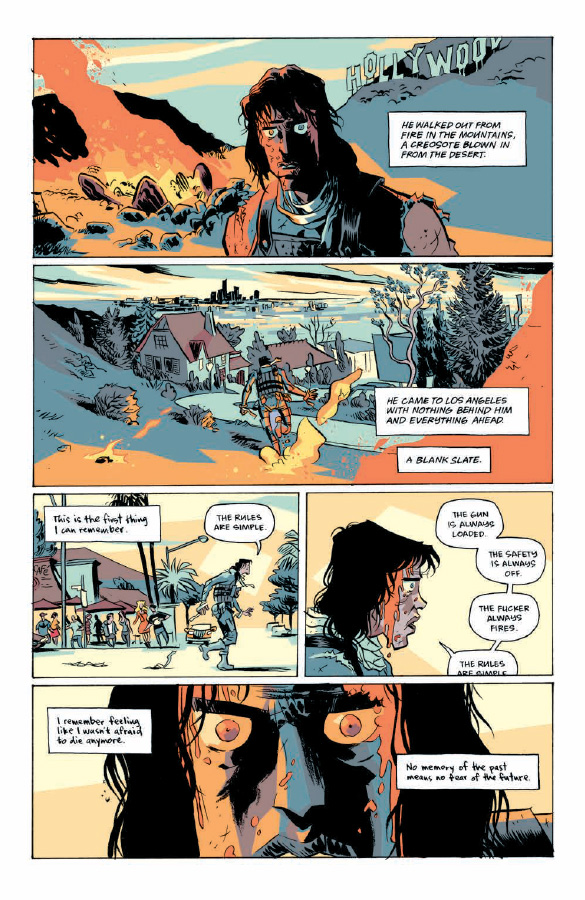 1:06:47-1:28:31: Jeff tries for the “Hail Mary” of “Okay, we’ve talked about Brian Bendis and we’ve talked about Quentin Tarantino—how can we contrast them a bit?” Does Bendis have thematic concerns and if so, what might they be?
1:06:47-1:28:31: Jeff tries for the “Hail Mary” of “Okay, we’ve talked about Brian Bendis and we’ve talked about Quentin Tarantino—how can we contrast them a bit?” Does Bendis have thematic concerns and if so, what might they be?


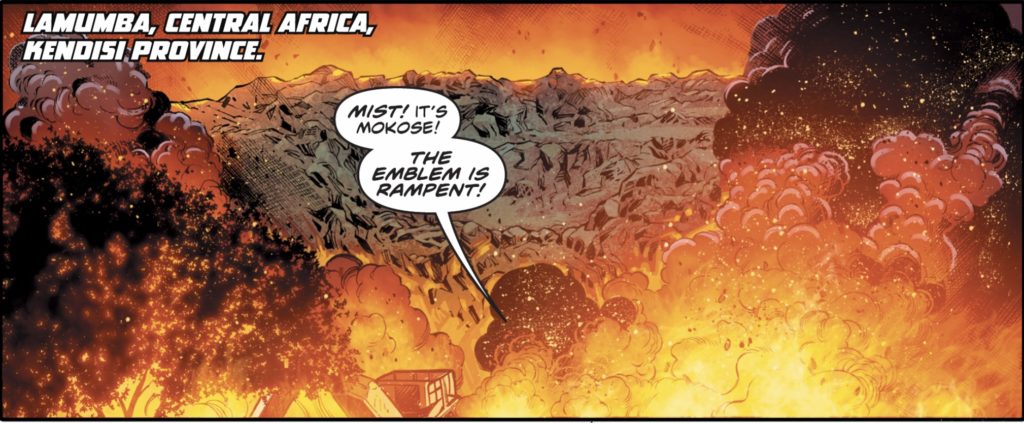
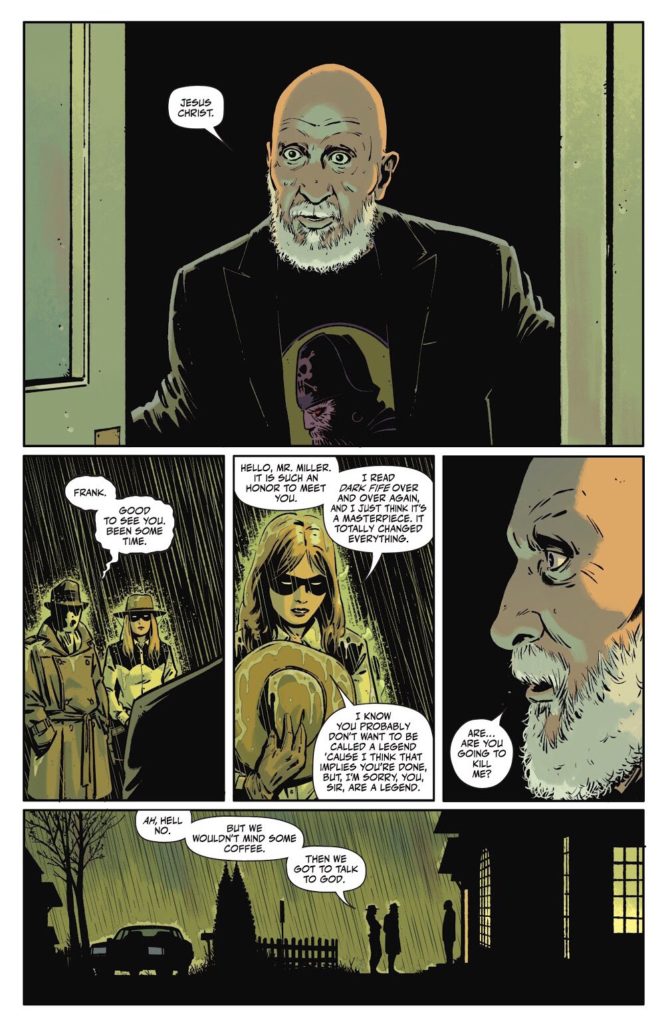
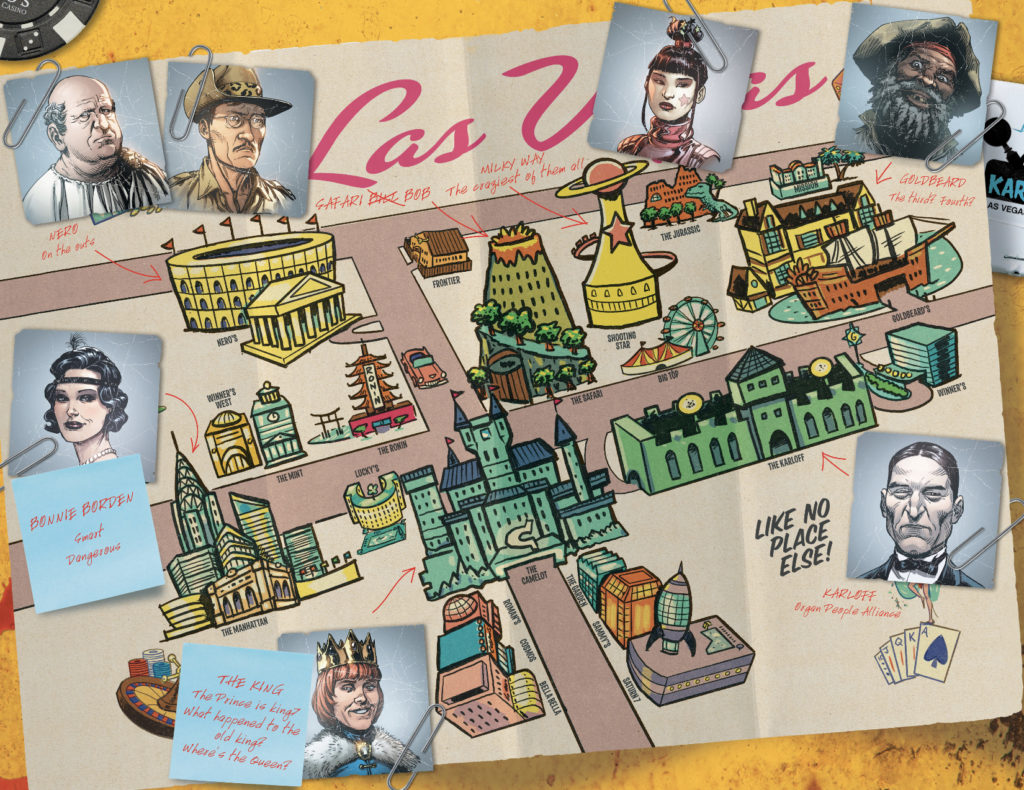
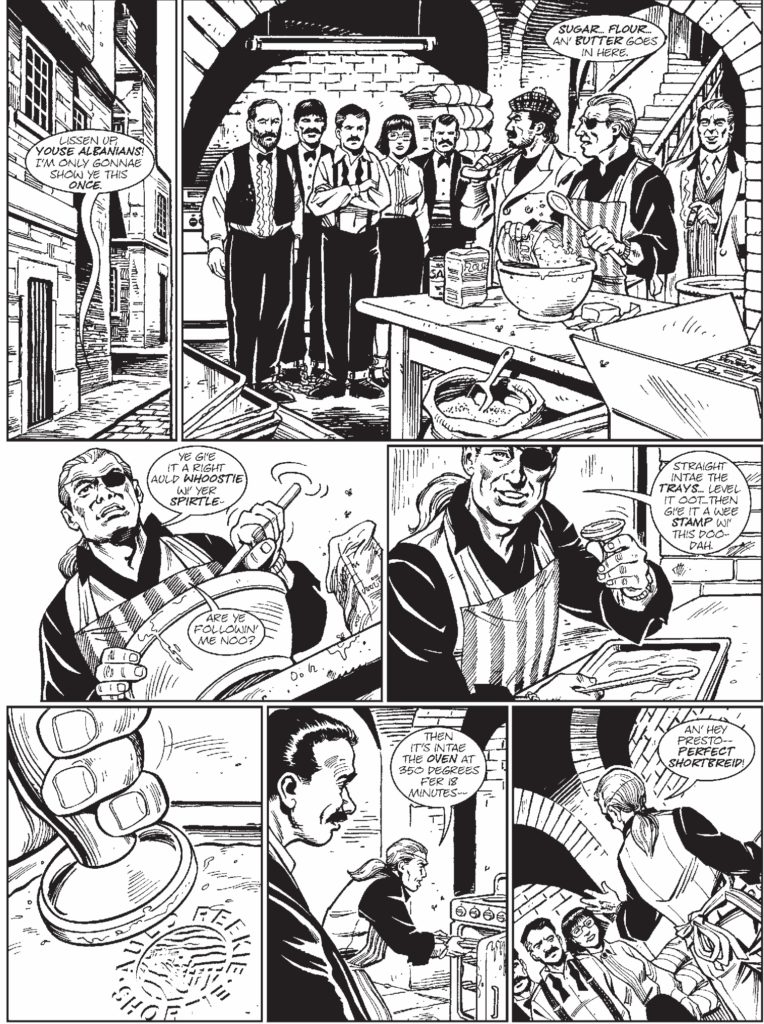
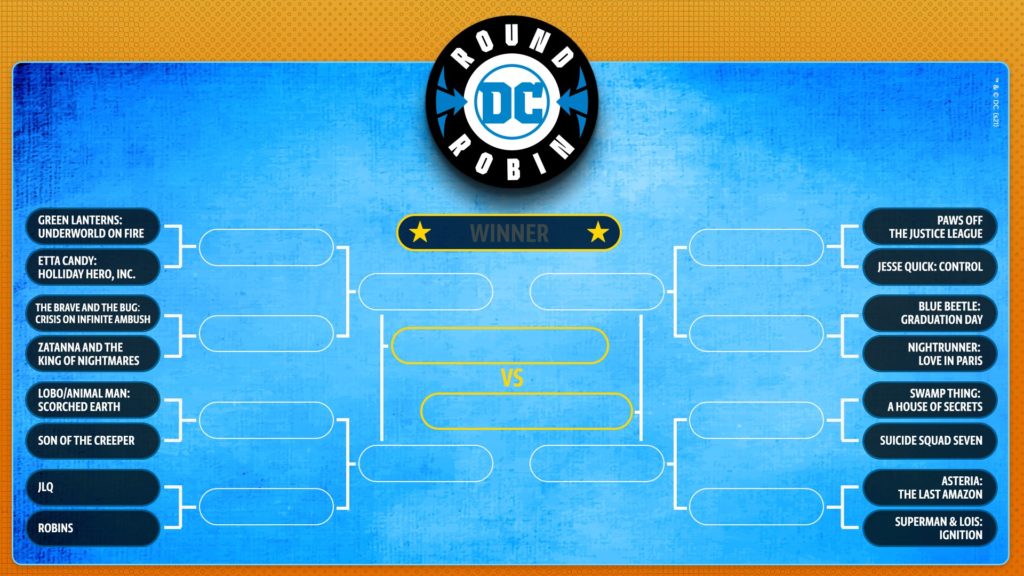
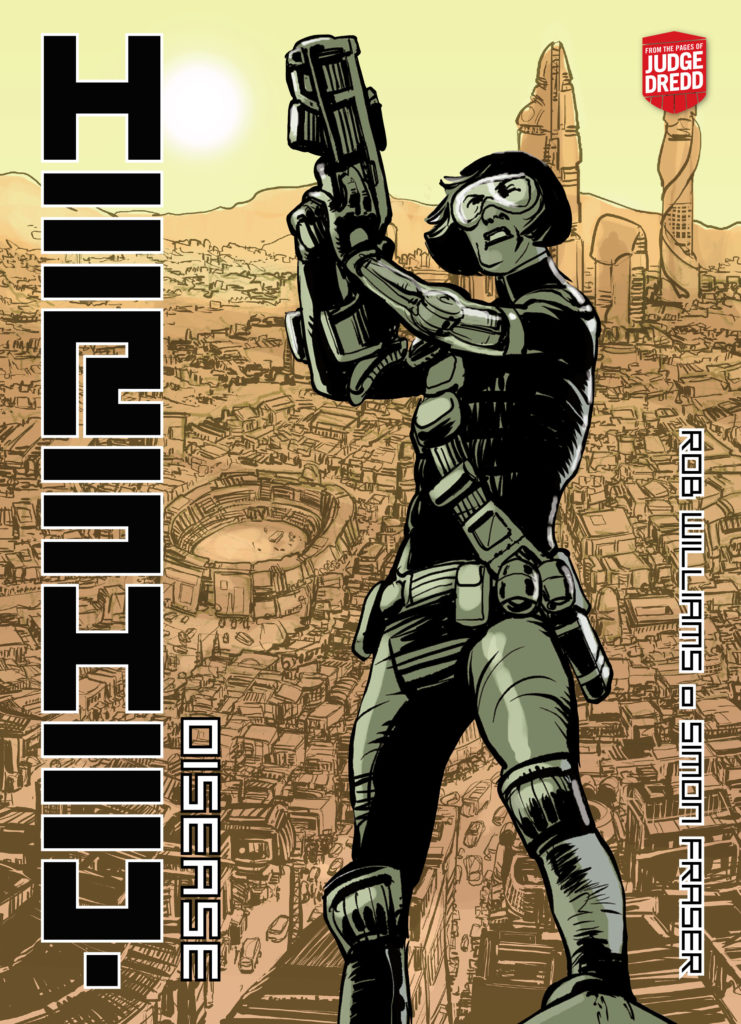
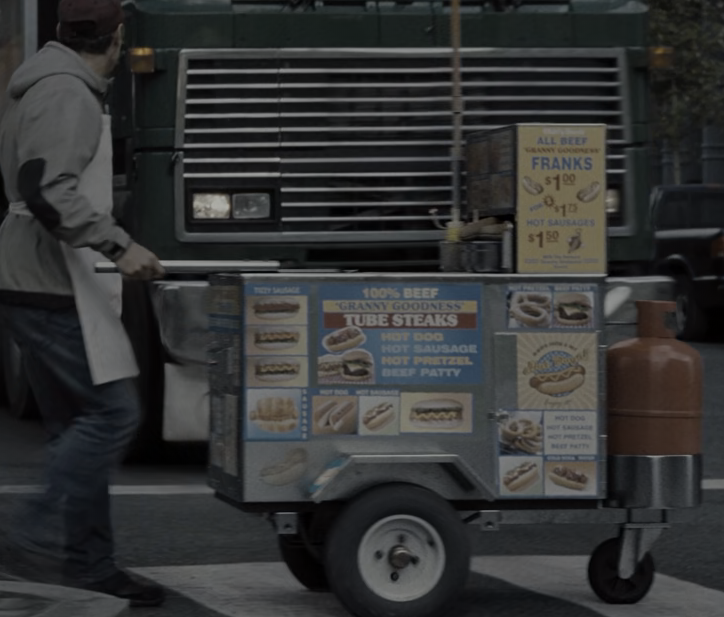
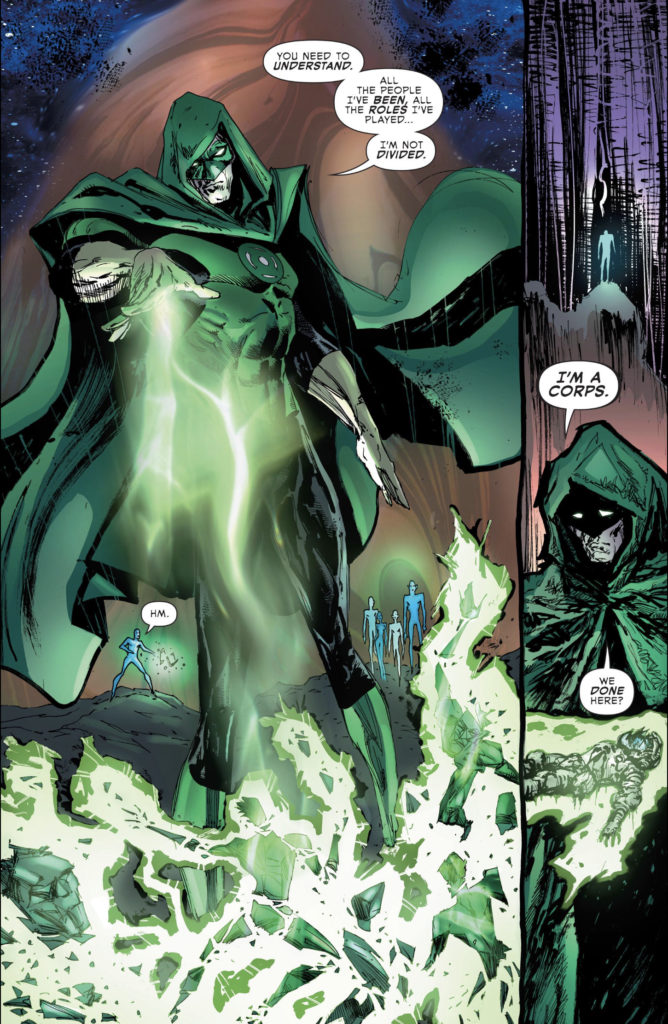
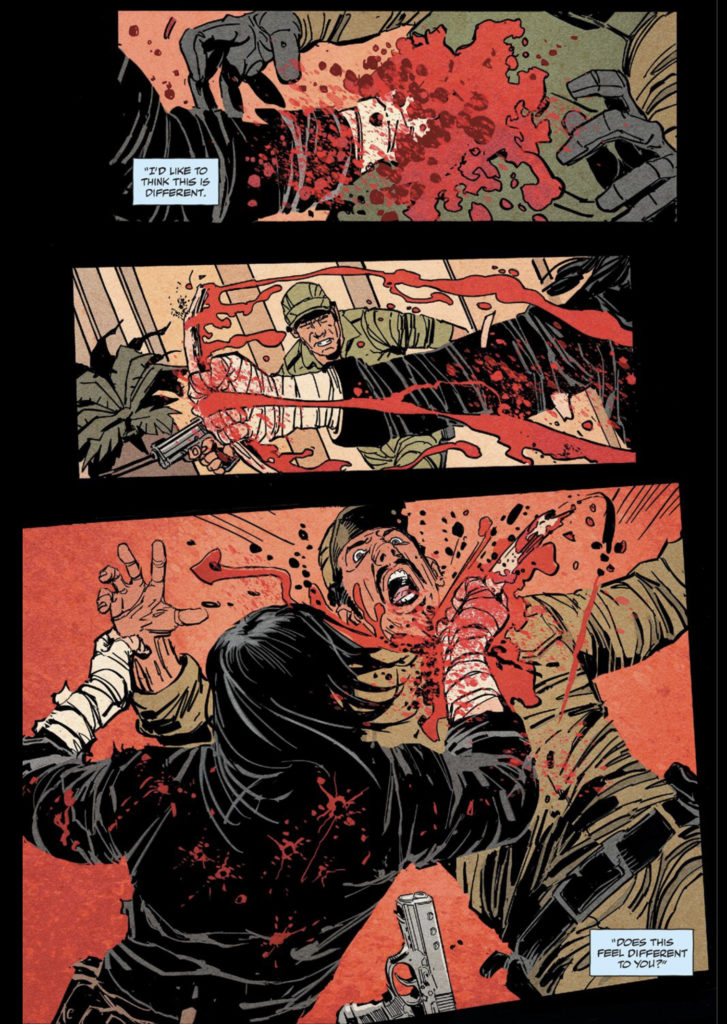
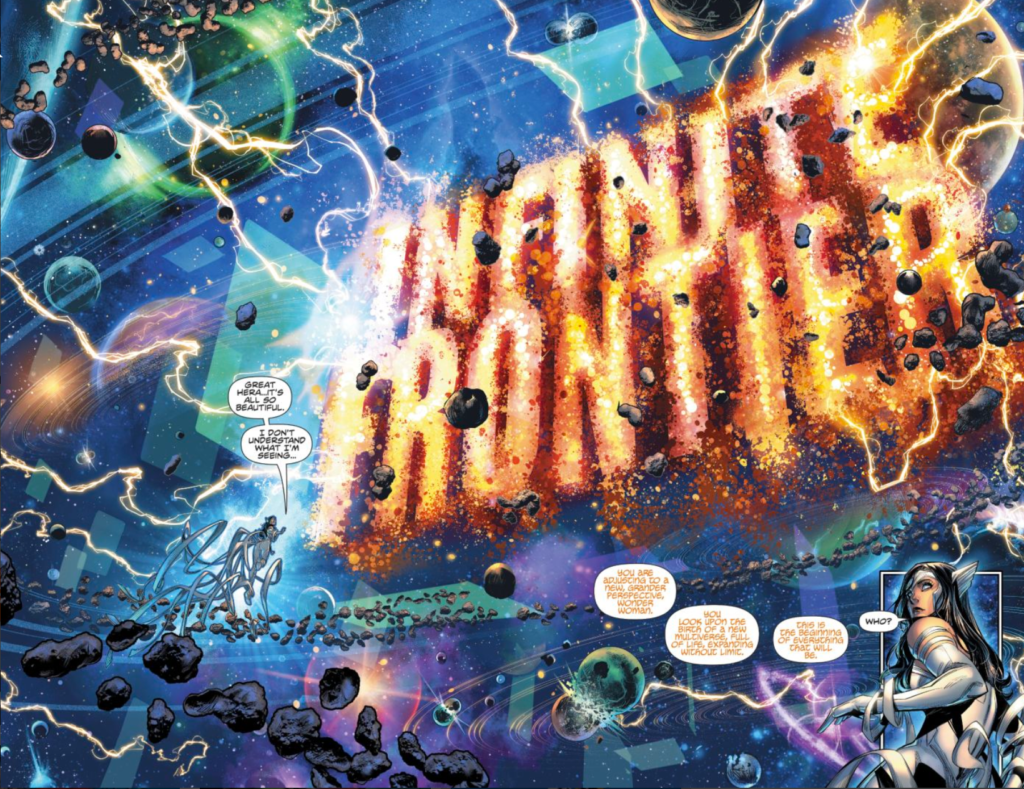
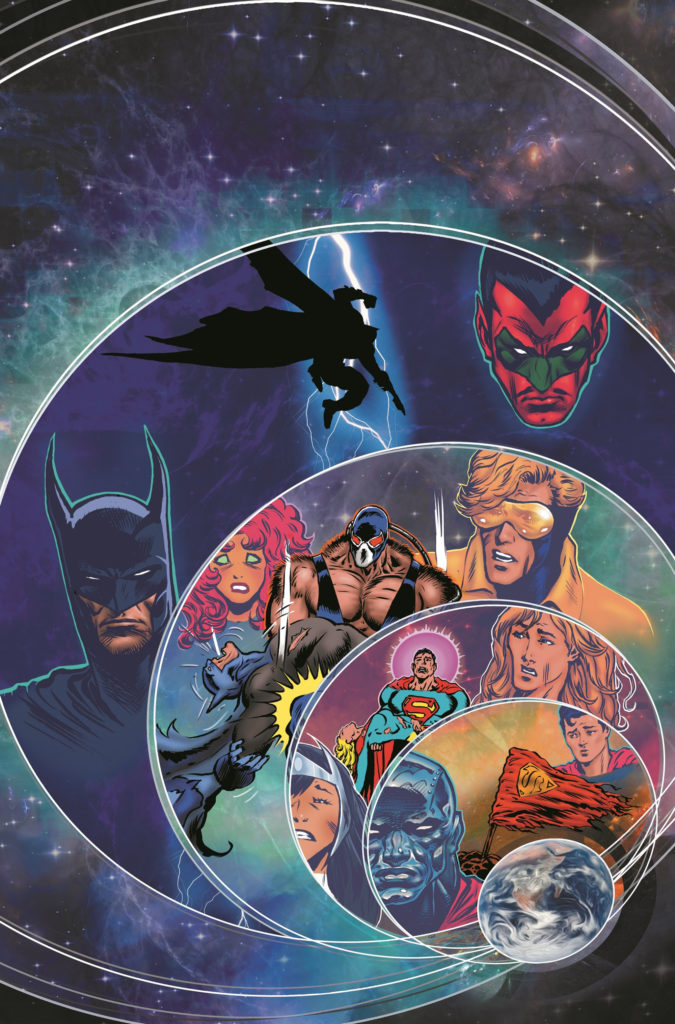
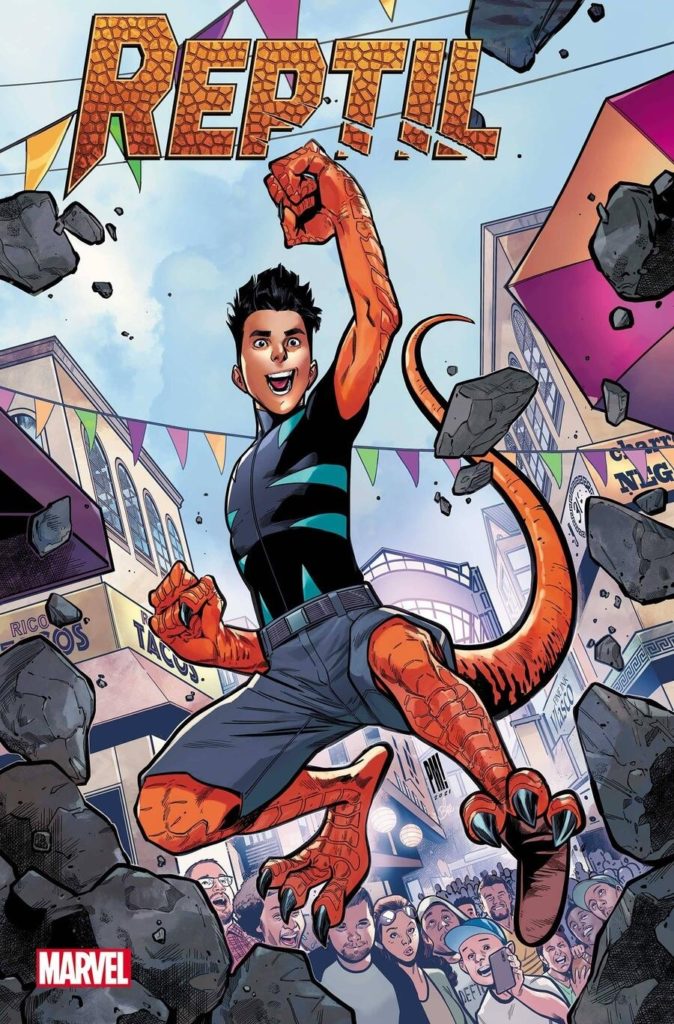
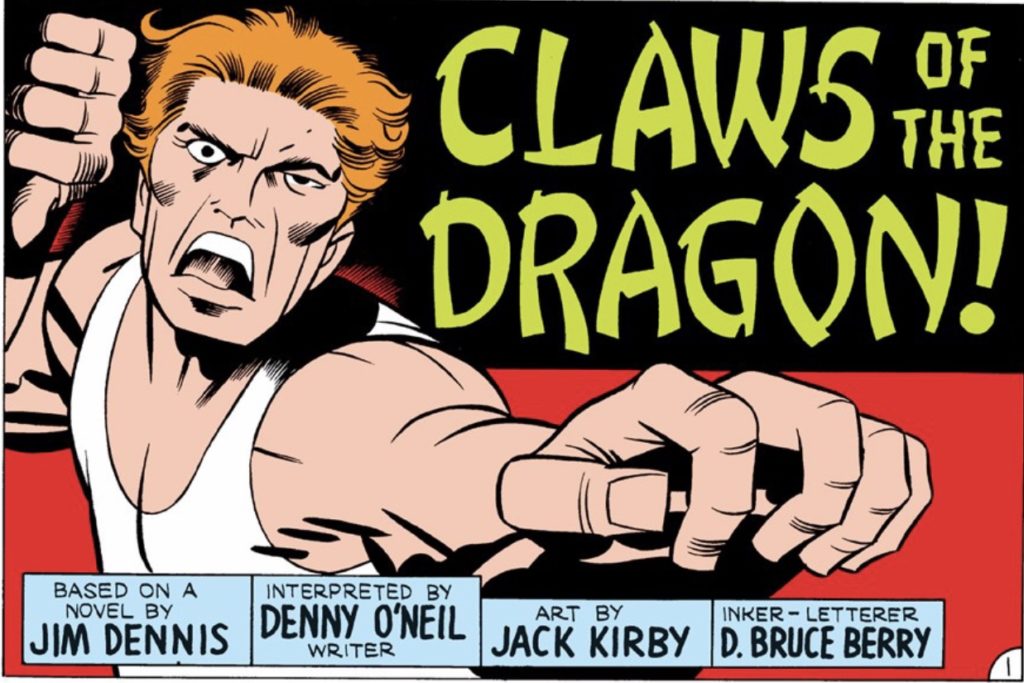
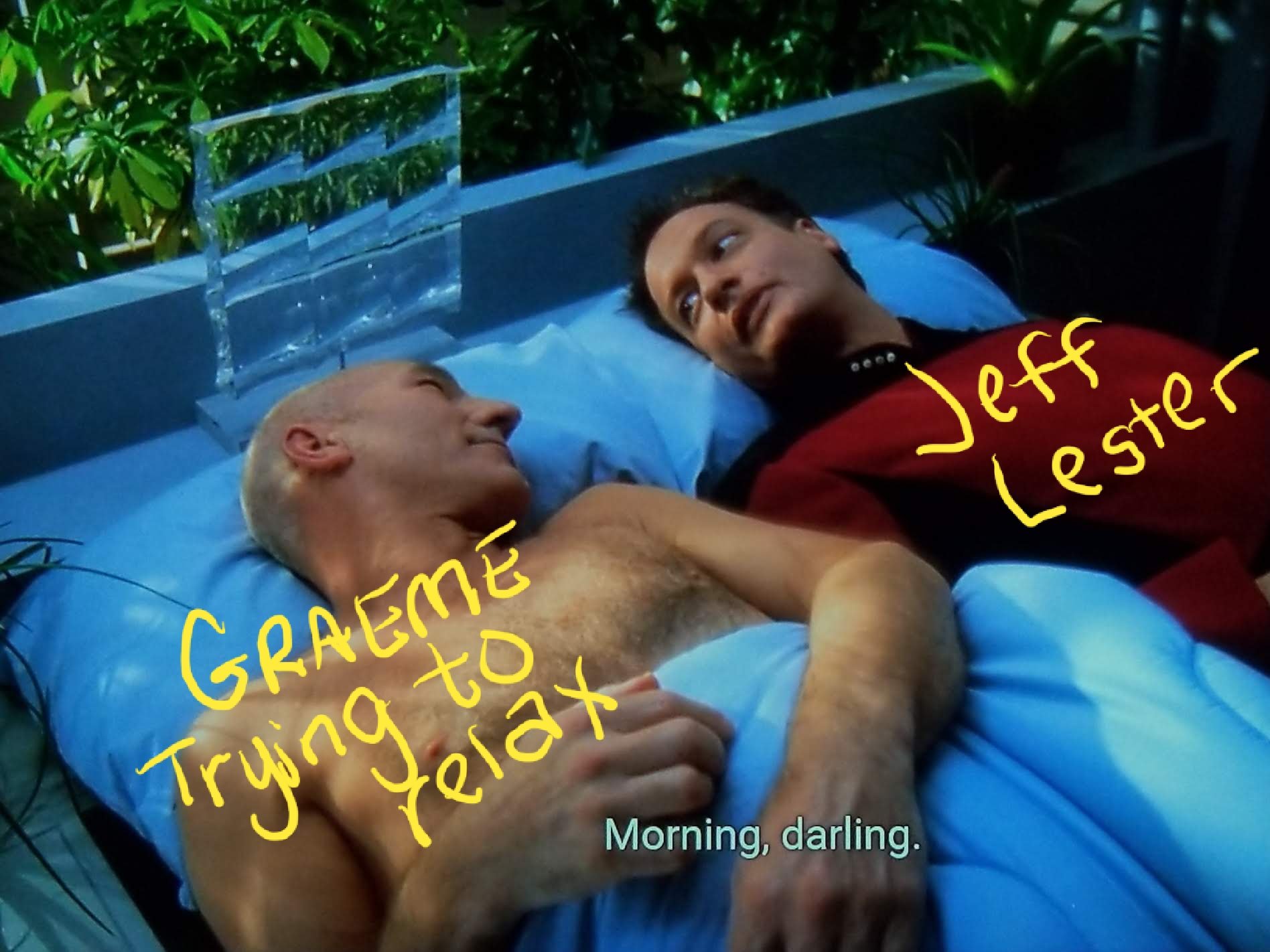
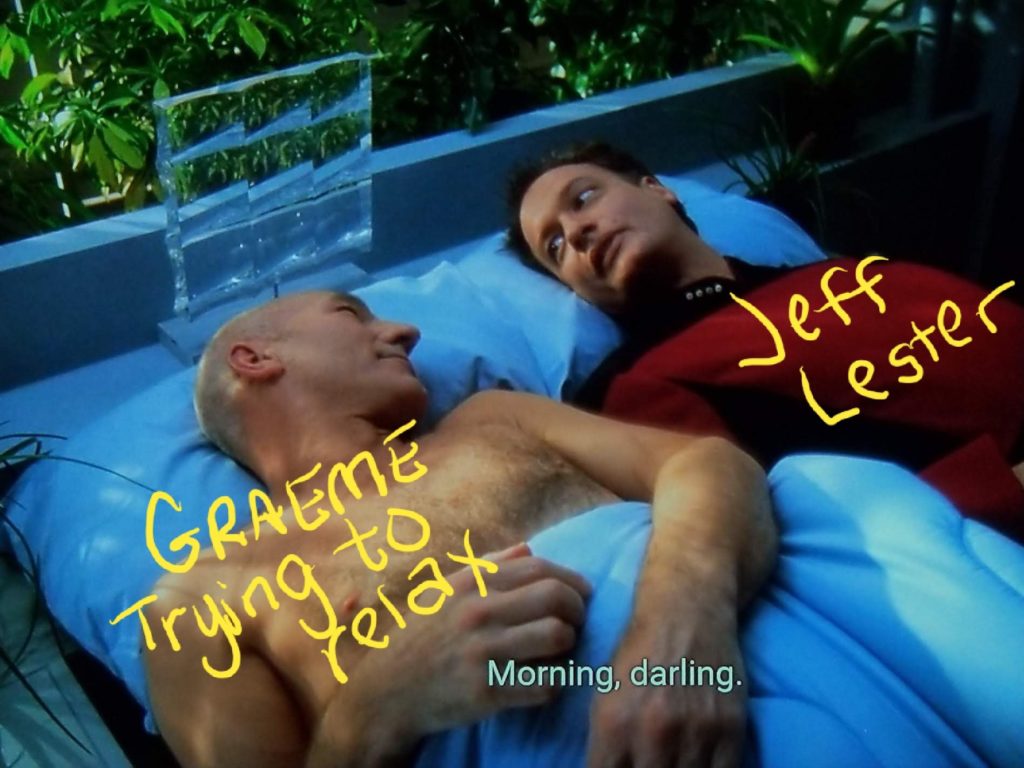
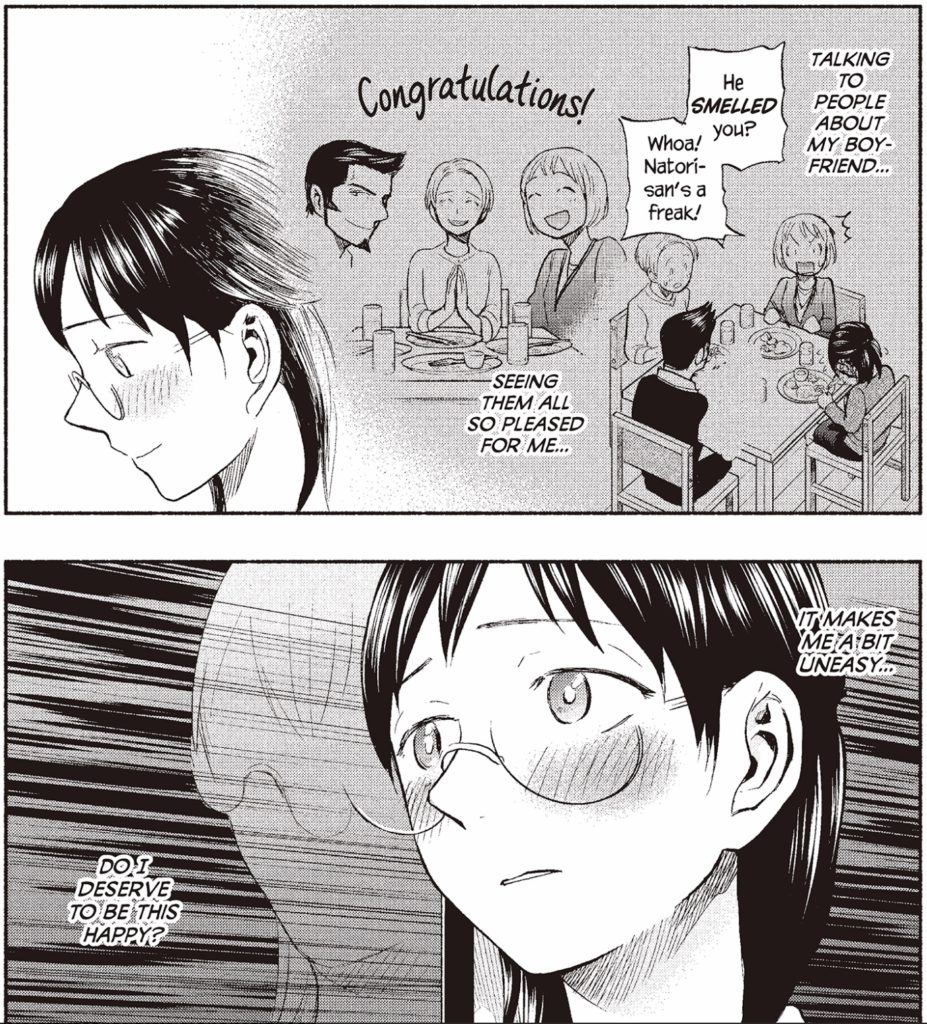


Recent Comments